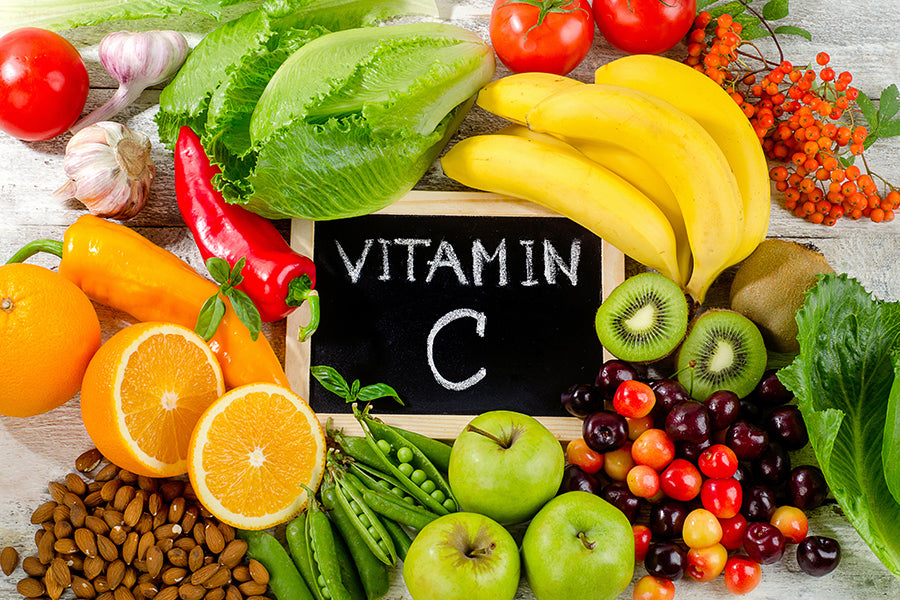Vitamin C is one of the most important for overall health and well-being. It is essential in keeping our bodies functioning optimally and providing numerous therapeutic benefits. The wonder vitamin has been studied extensively over the last few decades, and research continues to refine our understanding of its impressive capabilities. This blog post will discuss what vitamin C exactly does for us and outline some science-backed potential health benefits it offers.
Vitamin C and Vitamin C+
Vitamin C is an essential nutrient in the human body's daily functioning. It is crucial in maintaining a strong immune system, healthy skin, and critical bodily functions such as producing collagen and absorbing iron from food. Vitamin C can also act as an antioxidant to decrease oxidative stress from environmental toxins.
This essential vitamin can be ingested through dietary sources such as fresh fruits and vegetables, fortified cereals and juices, or oral supplements. However, trying to obtain your daily dose of Vitamin C through your diet is best rather than relying solely on supplementation. Eating various fruits and vegetables with diverse colors ensures you're obtaining adequate levels of this vital nutrient.
Vitamin C+ is a multi-dimensional supplement with high doses of Vitamin C designed to supplement an adequate amount of Vitamin C and other essential nutrients. It is packed with powerful antioxidants such as Vitamin C, Zinc, and Quercetin, which help fight off free radicals in the body.
What makes this supplement unique is its infusion of natural plant extracts, including Echinacea, Elderberry, and Astragalus Root; these three ingredients work together to increase resistance to everyday viruses and bacteria.
Additionally, its non-GMO vegetable capsules make it an ideal choice for those looking for a vegan-friendly alternative to traditional Vitamin C supplements. What ultimately sets Vitamin C+ apart from similar products on the market is its ability to provide a safe and effective way to get your daily dose of nutrients without any concerns about artificial additives or other harmful chemicals.
Health Benefits of Vitamin C
Vitamin C is one of the most important and readily available nutrients to stay healthy. It has various health benefits, such as it:
Boosts Collagen Production
Vitamin C is an essential nutrient that speeds up collagen production. Collagen is the body's main structural protein and has many essential functions, such as strengthening tissues and aiding wound healing. Vitamin C helps promote healthy skin, bones, and blood vessels by regulating collagen production.
Studies have found that supplementing with Vitamin C can help increase collagen production, which could lead to better overall health. Thus, a diet rich in Vitamin C or taken in supplement form can support our body's natural ability to produce more collagen.
Related Article: Collagen for Weight Loss: How Supplements May Help?
Enhances Immunity
Vitamin C is known to be a powerhouse when it comes to boosting the immune system. It is one of the key ingredients in keeping us healthy and vibrant and helping fight off illnesses and infections.
It is essential for building strong immunity because it helps increase the production of white blood cells and these white blood cells help us fight off viruses and bacteria. Studies have also shown that Vitamin C can reduce oxidative stress, an imbalance between our body's defenses and its toxic invaders, like viruses or bacteria – providing another layer of protection in strengthening immunity.
Has Antioxidant Properties
Vitamin C is a powerful antioxidant that helps combat oxidative stress and maintain the health of our cells. When our body tissues are exposed to environmental pollutants or pollutants found in food, Vitamin C can act as an antioxidant by intercepting damaging free radicals before they can attack our cells.
It can also help repair damaged molecules caused by inflammation. The antioxidant properties of Vitamin C have been linked to various health benefits, such as lowering blood pressure, improving cognitive function, increasing energy levels, and protecting against infection.
Helps Regulate Blood Sugar Levels
Vitamin C is a crucial nutrient for people with diabetes, as it helps regulate their blood sugar levels and enhance insulin sensitivity. Vitamin C has been shown to increase the use of glucose in the body, lowering blood sugar levels.
Furthermore, research indicates that individuals with diabetes often have vitamin C deficiencies due to impaired absorption or increased metabolic requirements. This deficiency can contribute to complications such as nerve damage and poor wound healing, both common occurrences in those with diabetes.
Taking supplemental vitamin C can help support healthy blood sugar and reduce these long-term health risks associated with the disease.
Related Article: 15 Best Foods to Lower High Blood Sugar
Prevents Iron Deficiency
Vitamin C plays a crucial role in helping the body absorb iron. Iron is necessary for producing red blood cells and transporting oxygen throughout the body, so it's essential to ensure our bodies have enough of it.
Vitamin C helps prevent iron deficiency by aiding in the absorption process. When taken together, Vitamin C and iron can work together more effectively due to the acidic environment that Vitamin C helps create in the stomach and intestines, which enhances the availability of dietary iron.
In addition, research has found that consuming small doses of Vitamin C can improve circulating iron levels within two weeks, providing further protection against deficiency. An adequate supply of Vitamin C and iron can help our bodies function efficiently.
Improves Cognitive Function
Emerging research suggests that Vitamin C plays a role in cognitive functioning and mental health. Studies suggest that Vitamin C protects the brain against oxidative stress and helps with memory retention, improved learning ability, neuroplasticity (the ability of neurons to adapt and change), increased alertness, and even mood regulation.
Perhaps most interestingly, studies illustrate that Vitamin C helps the body produce more neurotransmitter acetylcholine, which strongly links with improved cognitive functions such as attention, problem-solving, and associative learning.
Increasing your daily intake of Vitamin C could be an easy way to zero in on better cognitive functions and overall mental well-being.
Some Unproven Claims About Vitamin C
Vitamin C has some known health benefits, but some claims regarding its health benefits are not proven. Some claims that are not backed by scientific evidence include the following:
It Does Not Cure Common Cold
One of the most common claims about vitamin C is that it can cure a common cold. However, there is no scientific evidence to support this claim. Several studies have shown that vitamin C does not reduce the incidence or severity of colds.
It Does Not Prevent Cancer
Another common claim about vitamin C is that it can prevent cancer. While some observational studies have suggested that people who consume more vitamin C have a lower risk of developing cancer, these studies cannot prove that vitamin C causes this risk reduction.
It May Not Increase the Lifespan
A third common claim about vitamin C is that it can increase lifespan. However, there is no scientific evidence to support this claim. Some studies suggest that people who take a high dose of vitamin C have a lower risk of death from all causes, but these studies have mostly been criticized for their methodological flaws.
It Does Not Improve Athletic Performance
A fourth common claim about vitamin C is that it can improve athletic performance. While vitamin C is essential for overall health, there is no evidence that it can enhance athletic performance in healthy people.
Foods Rich in Vitamin C
Foods rich in Vitamin C that will help you maintain an adequate amount of Vitamin C include:
Oranges
Oranges are a popular fruit known for being rich in Vitamin C. A single orange contains over 70 mg of Vitamin C, over 100% of the recommended daily intake. In addition to being a good source of Vitamin C, oranges are also a good source of fiber and potassium.
Red Peppers
Red peppers are another excellent source of Vitamin C. A single cup of red peppers contains over 190 mg of Vitamin C, over 200% of the recommended daily intake. Red peppers are also a good source of other vitamins and minerals, such as Vitamin A, potassium, and folate.
Broccoli
Broccoli is a nutrient-rich vegetable that is also a good source of Vitamin C. A cup of broccoli contains over 80 mg of Vitamin C, over 100% of the recommended daily intake.
Brussels Sprouts
Brussels sprouts are another nutrient-rich vegetable that is high in Vitamin C. A single cup of Brussels sprouts contains over 140 mg of Vitamin C, over 150% of the recommended daily intake.
Grapefruit
Grapefruit is a citrus fruit known for being rich in Vitamin C. A half grapefruit contains over 60 mg of Vitamin C, over 80% of the recommended daily intake. Grapefruit is also a good source of fiber and potassium.
The Bottom Line
Vitamin C is essential for our health in many ways. It can help boost our immune system, fight off free radicals, and even help improve our cognitive function. While we can get vitamin C from many different foods, sometimes it's challenging to get enough from diet alone. That's why supplementing with vitamin C+ can be beneficial. Vitamin C+ is a high-quality supplement that can help provide your body with extra vitamin C. If you want to improve your health, consider adding vitamin C+ to your daily routine.
Reading List
Article Sources
- Afkhami-Ardekani, Mohammad, and Ahmad Shojaoddiny-Ardekani. “Effect of Vitamin C on Blood Glucose, Serum Lipids & Serum Insulin in Type 2 Diabetes Patients.” The Indian Journal of Medical Research, vol. 126, no. 5, Nov. 2007, pp. 471–74.
- Harrison, Fiona E., and James M. May. “Vitamin C Function in the Brain: Vital Role of the Ascorbate Transporter (SVCT2).” Free Radical Biology & Medicine, vol. 46, no. 6, Mar. 2009, pp. 719–30. PubMed Central, https://doi.org/10.1016/j.freeradbiomed.2008.12.018.
- Hemilä, Harri, and Elizabeth Chalker. “Vitamin C for Preventing and Treating the Common Cold.” The Cochrane Database of Systematic Reviews, vol. 2013, no. 1, Jan. 2013, p. CD000980. PubMed, https://doi.org/10.1002/14651858.CD000980.pub4.
- Jacob, Robert A., and Gity Sotoudeh. “Vitamin C Function and Status in Chronic Disease.” Nutrition in Clinical Care, vol. 5, no. 2, Apr. 2002, pp. 66–74. DOI.org (Crossref), https://doi.org/10.1046/j.1523-5408.2002.00005.x.
- Khoshfetrat, Mohammad Reza, et al. “Iron and Vitamin C Co-Supplementation Increased Serum Vitamin C Without Adverse Effect on Zinc Level in Iron Deficient Female Youth.” International Journal of Preventive Medicine, vol. 5, no. 8, Aug. 2014, pp. 1037–44. PubMed Central, https://www.ncbi.nlm.nih.gov/pmc/articles/PMC4258673/.
- Pehlivan, Fadime Eryılmaz. Vitamin C: An Antioxidant Agent. IntechOpen, 2017. www.intechopen.com, https://doi.org/10.5772/intechopen.69660.
- Travica, Nikolaj, et al. “Vitamin C Status and Cognitive Function: A Systematic Review.” Nutrients, vol. 9, no. 9, Aug. 2017, p. 960. PubMed Central, https://doi.org/10.3390/nu9090960.
- Wilson, Renée, et al. “Inadequate Vitamin C Status in Prediabetes and Type 2 Diabetes Mellitus: Associations with Glycaemic Control, Obesity, and Smoking.” Nutrients, vol. 9, no. 9, Sept. 2017, p. 997. PubMed Central, https://doi.org/10.3390/nu9090997.











